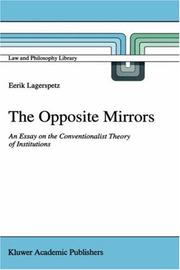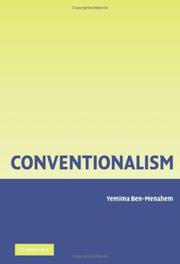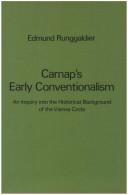| Listing 1 - 10 of 25 | << page >> |
Sort by
|
Book
ISBN: 3495477284 9783495477281 Year: 1992 Publisher: Freiburg: Alber,
Abstract | Keywords | Export | Availability | Bookmark
 Loading...
Loading...Choose an application
- Reference Manager
- EndNote
- RefWorks (Direct export to RefWorks)
Book
ISBN: 150174626X Year: 2019 Publisher: Ithaca, NY : Cornell University Press,
Abstract | Keywords | Export | Availability | Bookmark
 Loading...
Loading...Choose an application
- Reference Manager
- EndNote
- RefWorks (Direct export to RefWorks)
Alan Sidelle's Necessity, Essence, and Individuation is a sustained defense of empiricism-or, more generally, conventionalism-against recent attacks by realists. Sidelle focuses his attention on necessity a posteriori, a kind of necessity which contemporary realists have taken to support realism over empiricism. Turning the tables against the realists, Sidelle argues that if there are in fact truths necessary a posteriori, it is not realism, but rather empiricism which provides the best explanation for them.
Book
ISSN: 00834246 ISBN: 8323200475 9788323200475 Year: 1989 Volume: 48 Publisher: Poznan: Wydawnictwo naukowe UAM,
Abstract | Keywords | Export | Availability | Bookmark
 Loading...
Loading...Choose an application
- Reference Manager
- EndNote
- RefWorks (Direct export to RefWorks)

ISBN: 079233325X 9048145112 9401734097 9780792333258 Year: 1995 Volume: 22 Publisher: Dordrecht : Kluwer,
Abstract | Keywords | Export | Availability | Bookmark
 Loading...
Loading...Choose an application
- Reference Manager
- EndNote
- RefWorks (Direct export to RefWorks)

ISBN: 9780511584404 9780521826198 9781107407312 9780511281945 0511281943 0511584407 0521826195 1107407311 1107146844 9781107146846 1139809954 9781139809955 0511280742 9780511280740 1299398901 9781299398900 0511281560 9780511281563 110731805X Year: 2006 Publisher: Cambridge New York Cambridge University Press
Abstract | Keywords | Export | Availability | Bookmark
 Loading...
Loading...Choose an application
- Reference Manager
- EndNote
- RefWorks (Direct export to RefWorks)
The daring idea that convention - human decision - lies at the root both of necessary truths and much of empirical science reverberates through twentieth-century philosophy, constituting a revolution comparable to Kant's Copernican revolution. This book provides a comprehensive study of Conventionalism. Drawing a distinction between two conventionalist theses, the under-determination of science by empirical fact, and the linguistic account of necessity, Yemima Ben-Menahem traces the evolution of both ideas to their origins in Poincaré's geometric conventionalism. She argues that the radical extrapolations of Poincaré's ideas by later thinkers, including Wittgenstein, Quine, and Carnap, eventually led to the decline of conventionalism. This book provides a fresh perspective on twentieth-century philosophy. Many of the major themes of contemporary philosophy emerge in this book as arising from engagement with the challenge of conventionalism.
Book
Year: 1971 Publisher: The Hague : Mouton,
Abstract | Keywords | Export | Availability | Bookmark
 Loading...
Loading...Choose an application
- Reference Manager
- EndNote
- RefWorks (Direct export to RefWorks)
Truth. --- Inference. --- Convention (Philosophy). --- Reasoning.
Book
Year: 2017 Publisher: Berlin ; Boston : De Gruyter,
Abstract | Keywords | Export | Availability | Bookmark
 Loading...
Loading...Choose an application
- Reference Manager
- EndNote
- RefWorks (Direct export to RefWorks)
Convention (Philosophy) --- English language --- Philosophy.
Book
ISBN: 0674170156 9780674170155 Year: 1980 Publisher: Cambridge, Mass. Harvard University Press
Abstract | Keywords | Export | Availability | Bookmark
 Loading...
Loading...Choose an application
- Reference Manager
- EndNote
- RefWorks (Direct export to RefWorks)
Convention (Philosophy) --- Literature --- Criticism --- Philosophy --- History

ISBN: 9062035663 9004458476 9789062035663 9789004458475 Year: 1984 Volume: 7 Publisher: Amsterdam Rodopi
Abstract | Keywords | Export | Availability | Bookmark
 Loading...
Loading...Choose an application
- Reference Manager
- EndNote
- RefWorks (Direct export to RefWorks)
#GROL:MEDO-165.731.3 --- Convention (Philosophy) --- Logical positivism --- History

ISBN: 0521826195 1107407311 1139809954 1107146844 0511281943 110731805X 0511584407 0511280742 0511281560 1299398901 Year: 2006 Publisher: Cambridge ; New York : Cambridge University Press,
Abstract | Keywords | Export | Availability | Bookmark
 Loading...
Loading...Choose an application
- Reference Manager
- EndNote
- RefWorks (Direct export to RefWorks)
The daring idea that convention - human decision - lies at the root both of necessary truths and much of empirical science reverberates through twentieth-century philosophy, constituting a revolution comparable to Kant's Copernican revolution. This book provides a comprehensive study of Conventionalism. Drawing a distinction between two conventionalist theses, the under-determination of science by empirical fact, and the linguistic account of necessity, Yemima Ben-Menahem traces the evolution of both ideas to their origins in Poincaré's geometric conventionalism. She argues that the radical extrapolations of Poincaré's ideas by later thinkers, including Wittgenstein, Quine, and Carnap, eventually led to the decline of conventionalism. This book provides a fresh perspective on twentieth-century philosophy. Many of the major themes of contemporary philosophy emerge in this book as arising from engagement with the challenge of conventionalism.
Convention (Philosophy) --- History. --- Philosophy --- History --- Arts and Humanities
| Listing 1 - 10 of 25 | << page >> |
Sort by
|

 Search
Search Feedback
Feedback About UniCat
About UniCat  Help
Help News
News